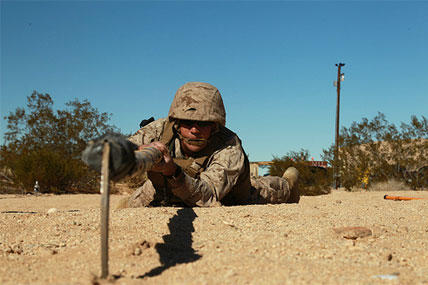House lawmakers want the Pentagon to present a plan to discontinue the Joint IED-Defeat Organization (JIEDDO) – an effort stood up during the wars in Iraq and Afghanistan to detect, counter and neutralize the full-range of improvised explosive devices.
Questions have circulated over the future of JIEDDO as the war in Afghanistan winds down. Critics have questioned whether the billions spent on the agency to protect troops deployed to Iraq and Afghanistan has yielded the right results.
The House Armed Services Subcommittee on Tactical Air and Land Forces asked the Pentagon issue a report in the next 60 days outlining JIEDDO's future to include how the agency could be split up should Secretary of Defense decide to break up the organization.
JIEDDO was stood up in 2006 to counter IEDs, roadside bombs, and other threats known to be weapons of choice by insurgents and adversaries.
The key question seems to be whether there is still a need for the organization in light of the reduction of troops in Afghanistan and whether JIEDDO is the right agency to head existing Counter-IED activities across and within the Defense Department.
The subcommittee asked within its markup of the 2014 defense budget that the plan detail an analysis of alternatives be done regarding future plans for the organization that specifies the cost, budget and organizational details in the event that the Secretary of Defense decides to end the JIEDDO organization.
For almost a decade, the JIEDDO organization has been at the forefront of the counter-IED fight funding, developing and delivering technologies and solutions aimed at saving lives and thwarting dangers posed by IEDs. Their work spans a range of activities, including the delivery of small tactical, bomb-detecting robots to sensors, IED "jamming" technologies and vehicle-specific protective equipment.
However, the organization has received its share of criticism including the Government Accountability Office. The watchdog group issued a report in August, 2012 outlining a lot of duplication and overlap between JIEDDO functions and other DoD Counter-IED efforts.
"From fiscal years 2006 through 2011, JIEDDO has received over $18 billion in funding, however, DOD has funded other C-IED efforts outside of JIEDDO, including $40 billion for Mine Resistant Ambush Protected vehicles," according to the report titled "Counter-Improvised Explosive Devices: Multiple DOD Organizations are Developing Numerous Initiatives."
The report cites a number of redundancies, claiming among other things that JIEDDO and other C-IED organizations were concurrently developing similar robotics technologies as well as chemical sensors.
"We've been doing work on JIEDDO for quite a while, assessing the importance of having a strategic plan and the importance of having metrics to measure success," said Cary B. Russell, GAO's director for defense capabilities and management issues.
Part of the concern expressed in several GAO reports specifies the lack of an integrated, comprehensive data base needed to identify metrics, and track and organize collaborative or potentially overlapping C-IED efforts.
At the same time, the GAO's "action tracker" from March of this year credits JIEDDO for beginning an implementation plan and establishing a timeline for the creation of an integrated DoD-wide C-IED database.
Also, JIEDDO has a Counter IED-Strategic Plan 2012 - 2016 listed on its website, which -- among other things -- outlines a strategic path forward and points to the continued importance of the C-IED mission and the likelihood that IEDs will remain a weapon of choice for adversaries such as insurgents, terrorists and even criminals.
"In the networks that support, supply, and employ IEDs, we see the nexus of narcotic, criminal, insurgent, and terrorist networks supported by the easy flow of dual-use components through legitimate businesses, using local readily available explosive materials, and a generation of combat-experienced IED makers -- all interacting and operating in current or emerging conflict areas," Lt. Gen. Michael Barbero, former JIEDDO director, writes in a forward letter to the plan.
"The IED threat and the networks that employ them will endure -- they are here to stay. This compelling threat requires us to maintain constant vigilance, an enduring counter-threat network, and counter-IED," he wrote.





























